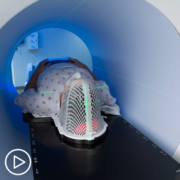Emerging Treatments for Head and Neck Cancer
Emerging Treatments for Head and Neck Cancer from Patient Empowerment Network on Vimeo.
Expert Dr. Ari Rosenberg discusses the importance of head and neck cancer clinical trials and shares an update about emerging research in treatment strategies and tumor DNA testing.
Dr. Ari Rosenberg is a medical oncologist and assistant professor of medicine at The University of Chicago Medicine. Learn more about Dr. Rosenberg.
See More From The Pro-Active Head and Neck Cancer Patient Toolkit
Related Programs:

|

|

What Do Patients Need to Know About Head and Neck Cancer Research? |
Transcript:
Katherine:
Well, that leads us to my next question, which is where do clinical trials fit in?
Dr. Rosenberg:
So, clinical trials are really important for head and neck cancer because as much as we have tools to treat the disease, the tools that we have are suboptimal.
They’re what we have, they’re what we use, and they can be quite successful in many cases, however, we can do better. We need better treatments for head and neck cancer. So, broadly, the clinical trials can actually be across multiple different treatment settings, whether earlier stage disease, or later stage disease. And the goal of the clinical trials are often to develop better treatments. What can that mean? Treatments that work better against the cancer, so help patients live longer with better quality of life.
Sometimes clinical trials evaluate strategies to reduce the toxicity, or the side effects associated with treatment, so many trials are trying to evaluate strategies to reduce some of those kinds of side effects with the treatment. And then many trials are also trying to use, for example, new biomarkers, or new tests, which can help sometimes predict which is the right treatment for the right patient.
One patient may need a more aggressive treatment, one may need a less intensive treatment. So, at our center, for example, we have clinical trials that, depending on the particular circumstance for those patients, that are trying to take what we have as the current standard, and build on that, to either improve survival and outcomes for patients, or reduce side effects, or both in order to optimize patient outcomes.
Many of our clinical trials incorporate new immune therapies. So, immune therapy treatments are strategies that harness the body’s immune system to attack cancer, and we’re trying to identify new ways to do that. Some of our clinical trials are focused on trying to make the radiation, or the chemotherapy and the radiation, a bit more precise, and focused on the specific tumor. And some are focused on identifying what the best treatment would be for one particular person’s tumor, because we know that actually it’s many different diseases.
And so, we want to really figure out what the optimized treatment is for giving patients that increases survival while reducing treatment-related toxicity. Again, that’s really the overarching goal of what we’re trying to achieve with clinical trials for head and neck cancer.
Katherine:
Yeah. What about emerging approaches for treating head and neck cancer? Is there research going on that patients should know about?
Dr. Rosenberg:
Yeah, definitely. So, many new drugs are being developed for head and neck cancer with many different treatment strategies. I would say given the success of immune therapy recently for head and neck cancer, and other cancer types as well, many are trying to build on that, and identify better immune therapies that work better against cancer therapies. Some are targeted therapies, so developing new drugs that maybe target a specific mutation, or a specific change in a particular patient’s tumor that would be appropriate.
And the other thing that is being developed is strategies that incorporate, for example, blood tests that can sometimes measure tumor DNA in blood in a non-invasive fashion that can reveal all sorts of specific information about that particular patient’s tumor, how they’re responding to therapy, and can hopefully help optimize and personalize therapy. So those are some of the more emerging approaches that are being developed in clinical trials for head and neck cancer.



